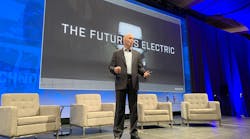LONG BEACH, CA. Battery-electric technology is the only viable way to achieve emissions-free driving, according to Roger Nielsen, president and CEO of Daimler Trucks North America.
And advancements are happening so rapidly, it is “the beginning of the post internal combustion engine era for commercial vehicles,” he said April 24 at the Advanced Clean Transportation (ACT) Expo.
Nielsen’s keynote speech was preceded by Meritor CEO Jay Craig, who offered a similar assessment of the current environment.
“Electric drivetrains are not a future concept. They are a reality of today,” Craig said. He projected batteries could become economical for “certain applications” as soon as 2025.
Nielsen, meanwhile, said fuel cells as range extenders “have promise,” but hydrogen fuel cells alone are not viable. “I can see glimpse of it over the horizon, but it will not be this generation of engineers who will be delivering it,” he said.
Nielsen called for additional financial incentives and government-industry partnerships to accelerate the advancements required to make it a “viable economic choice for the trucking community.”
DTNA has leveraged a $16 million grant from the South Coast Air Quality Management District in California to partially fund the Freightliner Electric Innovation Fleet. Before the end of the year, it will have nearly 50 electric trucks on U.S. highways, bringing Daimler’s worldwide total to 2,000.
In December, DTNA delivered the first all-electric Freightliner eM2 to Penske Leasing in Carson, CA. Penske held a ribbon cutting for new high-speed electric chargers at its location in La Mirada, CA., which was shown to ACT attendees via a live video feed.
In an interview with Fleet Owner after his speech, Nielsen downplayed any concerns about a drain on the power grid being a barrier to electric truck adoption.
While studies have shown the power grid could not currently support a transition of the entire U.S. trucking population, he said utility companies are preparing for a shift. He noted representatives of numerous utility companies were attending ACT Expo.
Nielsen also used the conference to announce plans to convert the manufacturing plant near the company’s headquarters in Portland, OR., to build electric Freightliners models. Renovations are scheduled to begin next year, prior to series production of the eCascadia and eM2 slated for 2021.
The decision “melds with future production plans.” It also means the vehicles are made on the west coast, where more initial demand for the vehicles are expected.
DTNA’s Thomas Built Buses unit will build all-electric school buses in High Point, N.C. The Saf-T-Liner eC2 is powered by a battery system developed by ProTerra. Last September, Proterra announced it closed a $155 million investment round co-led by Daimler.



